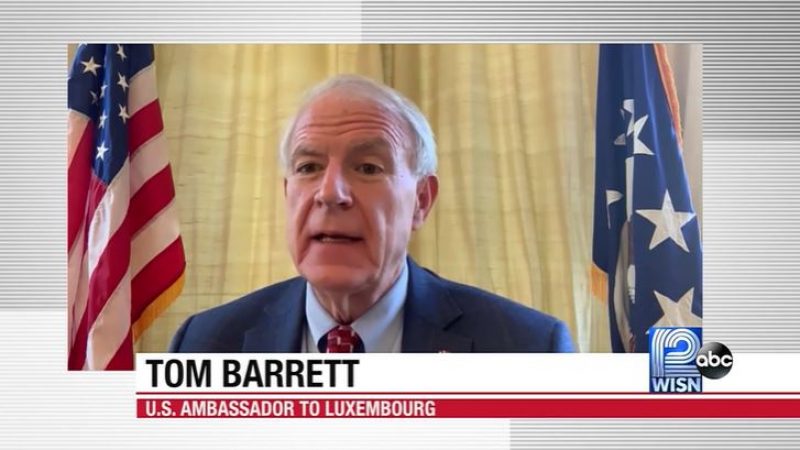U.S. Ambassador to Luxembourg Tom Barrett calls the unfolding Russia-Ukraine crisis a “very dangerous time.”
Barrett, the former longtime mayor of Milwaukee, is providing U.S. intelligence to Luxembourg officials as the country increases its aid to Ukraine and begins to accept Ukrainian refugees.
“Obviously we get communications on an hourly basis out of D.C. to let us know what the current thinking is, what the latest intelligence is,” Barrett said on WISN’s “UpFront,” produced in partnership with WisPolitics.com. “That’s been one of the surprises, a lot of intelligence I have access to let me know what’s going on.”
Barrett said he’s routinely in communication with the prime minister of Luxembourg and other top officials.
>> WisPolitics is now on the State Affairs network. Get custom keyword notifications, bill tracking and all WisPolitics content. Get the app or access via desktop.
“Every single step of the way, our intelligence accurately predicted what Russia’s next steps would be,” Barrett said. “And I think that has given us greater credibility with our allies here.”
The transition for Barrett from the mayor to ambassador has been quick and intense.
“What I thought would be a relatively smooth and quiet transition has been anything but that,” he said. “I think anybody has to be concerned right now because it is so irresponsible and dangerous, and I think criminal, what is going on in Ukraine.”
Also in Eastern Europe, Katelyn Ferral is reporting on the growing humanitarian crisis from Poland for the Milwaukee Journal Sentinel and USA Today.
“Many of the people have spent more than 20 hours traveling depending on where they were coming from,” Ferral said. “As Kyiv started to get worse and the bombings increased there, there was a limited time when there ended up being a smaller window where they said if you’re going to leave Kyiv, you need to leave now.”
Ferral has been documenting her reporting on her Twitter account.
“Packed train cars,” she said. “I’ve tweeted some videos you can see standing room only in a train car where people are traveling for over 24 hours. But what I’ve seen as soon as they’ve gotten off the train here in Poland, they’re met with volunteers, hot soup, things of food.”
Also on the program, Wisconsin Elections Commission Administrator Meagan Wolfe countered Michael Gableman’s report on the 2020 election and his calls to dissolve the Wisconsin Elections Commission.
“This report is based upon complete misrepresentations of Wisconsin election law, federal election law and of election administration and technology,” Wolfe said. “These are six bipartisan members of the commission that are appointed by legislative leadership. The commission was created in 2016 and is operating exactly as it’s designed to operate by law.”
Wolfe reaffirmed her position and that of the Wisconsin Department of Justice, which is representing Wolfe, that she will not meet in private with Gableman unless ordered by a court to do so.
And she rebuffed calls for her to resign.
“It’s a difficult job,” Wolfe said. “It certainly is a difficult job, and it gets more difficult every day. But I’m not going to let attempts to bully me, to intimidate me lead to me not continuing to do my job, which I’ve done with integrity.”
See the Elections Commission’s response to Gableman’s report here.
Finally on the show, the state Senate is scheduled to take up bipartisan legislation tomorrow that would make it a felony to threaten a health care worker in Wisconsin. The Assembly has already passed the bill.
Marty Beth Kingston, a chief nursing officer at Advocate Aurora Health, said the legislation is a critical piece to workplace safety at a time threats are increasing against health care workers.
“We have had health care workers that have been the victims of physical violence and threats, significant threats where they’re really being threatened with bodily harm or their family members have been threatened,” Kingston said. “The divisiveness in our society over vaccinations and masking, and we do have a safe care promise and we do ask people to mask when coming into our hospitals, and we’re beginning to see a fair amount of discord and aggressiveness about individuals who disagree with some of those policies.”
See more from the show at WISN.



